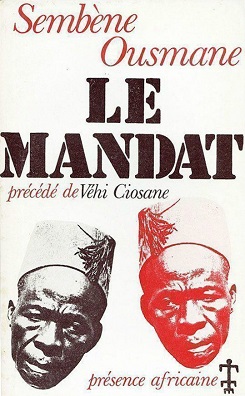Related Research Articles

Léopold Sédar Senghor was a Senegalese poet, politician and cultural theorist who was the first president of Senegal (1960–80).

Mariama Bâ was a Senegalese author and feminist, whose two French-language novels were both translated into more than a dozen languages. Born in Dakar, she was raised a Muslim.
Négritude is a framework of critique and literary theory, developed mainly by francophone intellectuals, writers, and politicians of the African diaspora during the 1930s, aimed at raising and cultivating "Black consciousness" across Africa and its diaspora. Négritude gathers writers such as sisters Paulette and Jeanne Nardal, Martinican poet Aimé Césaire, Abdoulaye Sadji, Léopold Sédar Senghor, and Léon Damas of French Guiana. Négritude intellectuals disavowed colonialism, racism and Eurocentrism. They promoted African culture within a framework of persistent Franco-African ties. The intellectuals employed Marxist political philosophy, in the Black radical tradition. The writers drew heavily on a surrealist literary style, and some say they were also influenced somewhat by the Surrealist stylistics, and in their work often explored the experience of diasporic being, asserting one's self and identity, and ideas of home, home-going and belonging.

Ousmane Sembène, often credited in the French style as Sembène Ousmane in articles and reference works, was a Senegalese film director, producer and writer. The Los Angeles Times considered him one of the greatest authors of Africa and he has often been called the "father of African film". Descended from a Serer family through his mother from the line of Matar Sène, Ousmane Sembène was particularly drawn to Serer religious festivals especially the Tuur festival.

Sony Lab'ou Tansi, born Marcel Ntsoni, was a Congolese novelist, short-story writer, playwright, and poet in French language. Though he was only 47 when he died, Tansi remains one of the most prolific African writers and the most internationally renowned practitioner of the "New African Writing." His novel The Antipeople won the Grand Prix Littéraire d'Afrique Noire. In his later years, he ran a theatrical company in Brazzaville in the Republic of the Congo.
The African Writers Series (AWS) is a collection of books written by African novelists, poets and politicians. Published by Heinemann, 359 books appeared in the series between 1962 and 2003.

Ousmane Tanor Dieng was the First Secretary of the Socialist Party of Senegal. He was vice-president of the Socialist International from 1996 until his death.

William Heinemann Ltd., with the imprint Heinemann, was a London publisher founded in 1890 by William Heinemann. Their first published book, 1890's The Bondman, was a huge success in the United Kingdom and launched the company. He was joined in 1893 by Sydney Pawling. Heinemann died in 1920 and Pawling sold the company to Doubleday, having worked with them in the past to publish their works in the United States. Pawling died in 1922 and new management took over. Doubleday sold his interest in 1933.

The money-order with White genesis is a book containing two novellas by Senegalese author Ousmane Sembène, first published in French in 1966. An English-language translation was published in 1972. It tells two stories. In White Genesis, a mother struggles with conflict after her teenage daughter's pregnancy becomes apparent. In The Money-order, a man receives a money-order from a relative living in Paris.

Présence Africaine is a pan-African quarterly cultural, political, and literary magazine, published in Paris, France, and founded by Alioune Diop in 1947. In 1949, Présence Africaine expanded to include a publishing house and a bookstore on rue des Écoles in the Latin Quarter of Paris. The journal was highly influential in the Pan-Africanist movement, the decolonisation struggle of former French colonies, and the birth of the Négritude movement.

Senegalese literature is written or literary work which has been produced by writers born in the West African state. Senegalese literary works are mostly written in French, the language of the colonial administration. However, there are many instances of works being written in Arabic and the native languages of Wolof, Pulaar, Mandinka, Diola, Soninke and Serer. Oral traditions, in the form of Griot storytellers, constitute a historical element of the Senegalese canon and have persisted as cultural custodians throughout the nation’s history. A form of proto-Senegalese literature arose during the mid 19th century with the works of David Abbé Boilat, who produced written ethnographic literature which supported French Colonial rule. This genre of Senegalese literature continued to expand during the 1920s with the works of Bakary Diallo and Ahmadou Mapaté Diagne. Earlier literary examples exist in the form of Qur’anic texts which led to the growth of a form African linguistic expressionism using the Arabic alphabet, known as Ajami. Poets of this genre include Ahmad Ayan Sih and Dhu al-nun.

Dr Sebastian Okechukwu Mezu(listen) is a Nigerian writer, scholar, philanthropist, and publisher. He was involved in politics in Nigeria in the late 1970s.
John O. Reed was an anthologist and translator of African literature.

Yandé Codou Sène was a Senegalese singer from the Serer ethnic group. She was born in 1932 at Somb in the Sine-Saloum delta and died on July 15, 2010 at Gandiaye in Sénégal. She was the official griot of president Léopold Sédar Senghor. Most of her music is in the Serer language.
Kopé Tiatie Cac is the Supreme Creator in the Serer religion. Kopé Tiatie Cac is the name used by the Ndut people to refer to the Supreme being. Among the Ndut and followers of Serer religion, Kopé Tiatie Cac is associated with death and plague (pisti).

Ceddo, also known as The Outsiders, is a 1977 Senegalese drama film directed by Ousmane Sembène. It was entered into the 10th Moscow International Film Festival.

Black Orpheus was a Nigeria-based literary journal founded in 1957 by German expatriate editor and scholar Ulli Beier that has been described as "a powerful catalyst for artistic awakening throughout West Africa". Its name derived from a 1948 essay by Jean-Paul Sartre, "Orphée Noir", published as a preface to Anthologie de la nouvelle poésie nègre et malgache, edited by Léopold Sédar Senghor. Beier wrote in an editorial statement in the inaugural volume that "it is still possible for a Nigerian child to leave a secondary school with a thorough knowledge of English literature, but without even having heard of Léopold Sédar Senghor or Aimé Césaire", so Black Orpheus became a platform for Francophone as well as Anglophone writers.
Fatou Bintou Kandé Senghor is a Senegalese film director, writer, and photographer.
Younousse Sèye is a Senegalese artist and actress. Considered Senegal's first woman painter, she is best known for her mixed-media works incorporating cowrie shells. Having no formal training in either visual art or acting, she achieved success in the post-independence Dakar art scene and appeared in several major films by the Senegalese director Ousmane Sembène.
References
- ↑ Sony Lab'Ou Tansi, The Seven Solitudes of Lorsa Lopez , 1995, p. 1.